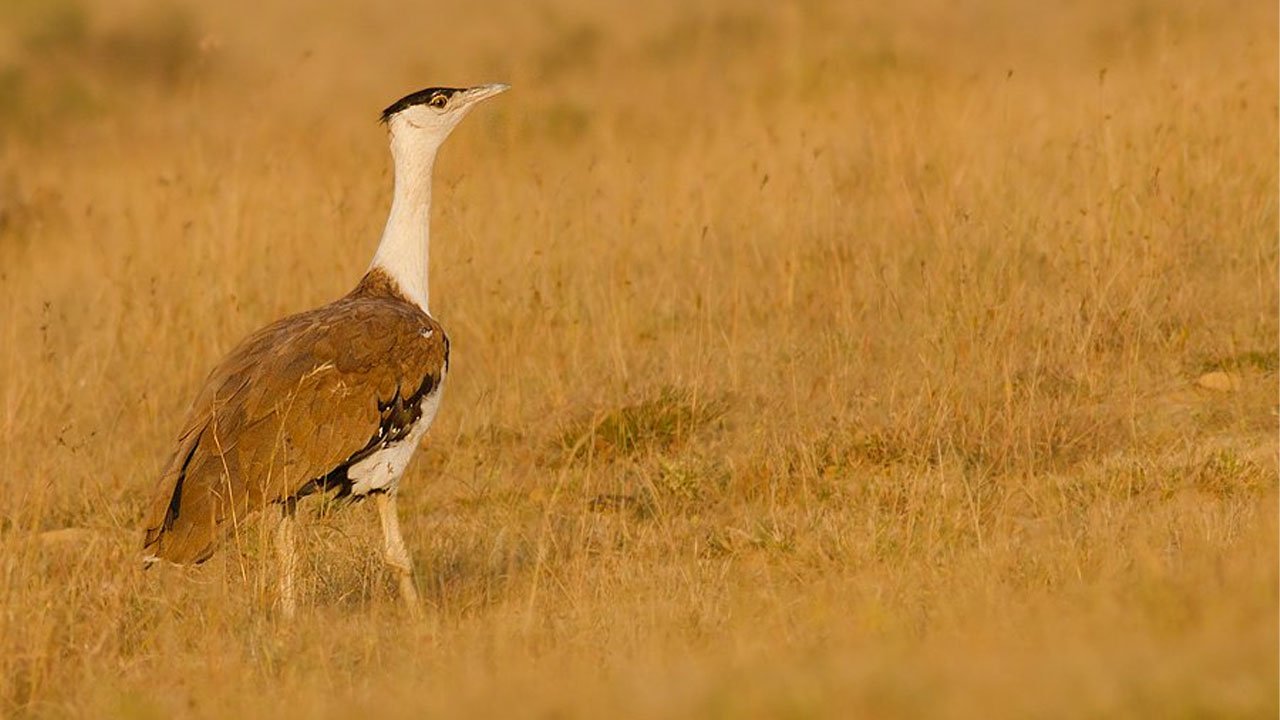
The Great Indian Bustard was poached in Pakistan recently and the poachers got themselves photographed with the carcasses of birds in their hands and guns on their shoulders. Surprisingly the incident received no stern action in Pakistan, but gave shock to Indian conservationists…EBNW reports…
The Great Indian Bustard (GIB) has ‘Great’ accommodated in its name but it may now have ‘less’ greater meaning. Reasons?
John P. Raffety, editor of Encyclopedia Britannica, says, “The GIB was listed as “Endangered Species” on International Union for Conservation of Nature and Natural Resources (IUCN) Red List of threatened species in 1994. By 2011, however, the population decline was so severe that the IUCN reclassified the species as “Critically Endangered”. An estimated 50 to 250 mature birds remain. Their largest concentration, perhaps 175 birds, occurs in state of Rajasthan, India.”

John is editor of Encyclopedia Britannica. He writes about Earth processes and environment. The WWF – India says, “The biggest threat to this species is hunting, which is still prevalent in Pakistan” neighbour to India.
WWF – India’s claim has been proved correct, again.
The Great Indian Bustards poached in Pak

On 2 April, 2021, two male GIBs were poached in Pakistan’s Cholistan desert. The poachers got themselves photographed with the carcasses of birds in their hands and guns on their shoulders. While the incident received no stern action in Pakistan, it gave shock to Indian conservationists
This group of hunters, allegedly led by a retired Major of the Pakistan Army, enacted the poaching-scene in Pakistan in its protected area of southern Punjab’s Cholistan game reserve. He is known as retired Major Tanveer Hussain Shah, a resident of Rahim Yar Khan district. With his accomplices, he also attacked wildlife officials of that country when they tried to stop the group from hunting GIBs and chinkara deer.
The Great Indian Bustards poached: TWSI condemns the poaching
The Tourism & Wildlife Society of India (TWSI) has condemned the poaching of GIBs, while expressing surprise that the people in the neighbouring country continued to kill this rare species of birds. “It cannot take place without the cover provided by the government authorities in Pakistan. This incident should be probed thoroughly and the poachers punished,” TWSI honorary secretary Harsh Vardhan said.
“As Rajasthan shares the international border with Pakistan’s Sindh and Punjab provinces, it is suspected that Indian-bred GIBs will fly across to Pakistan’s desert and will be easy prey for the gun-toting poachers there. This incident is a clear indication of the things to come,” Mr. Vardhan said.

Great Indian Bustard killed: The Wildlife Institute of India’s speaks
Wildlife Institute of India’s Dean and senior scientist, Yaduvendradev Jhala said the project teams had surveyed the border areas near Bikaner and had not found any GIB there. The habitat in Cholistan, where the GIBs were killed, looked much better than the Indian side, as it had no cattle, he said.
Jhala along with his scientist colleague, Suthirtha Datta, assisted wildlife authorities in Rajasthan to succeed with captive breeding of GIB in the Desert National park (DNK), Jaisalmer, after a prolonged debate, how and why to do it.
Great Indian Bustard breeding: 16 chicks reared in DNP
Sixteen chicks of GIB are in hands now (May 2021) being reared in DNP by a team technically supported by the Houbara Breeding Centre of United Arab Emirates, located in Abu Dhabi.
At a time when India had stepped up breeding initiatives for the GIB, such an incident taking place in Pakistan was “most horrendous”, said Vardhan. The TWSI has shot off a letter to the Pakistan High Commission seeking a probe by its government and calling for stringent punishment to the poachers.
Great Indian Bustard poaching: Pak group raises concern
A Pakistani environmentalists’ group, Save the Wild, has also sought the intervention of Army chief Gen. Qamar Javed Bajwa in the matter, since the main culprit is a retired Army officer. The group has appealed to Gen. Bajwa to ensure the survival of wildlife in Cholistan, so that the GIB, facing the threat of extinction, is protected.
Note: The graph in the feature image and cartoon are courtesy Devesh Gadvi, Deputy Director at The Corbett Foundation, engaged in conservation of the species.

